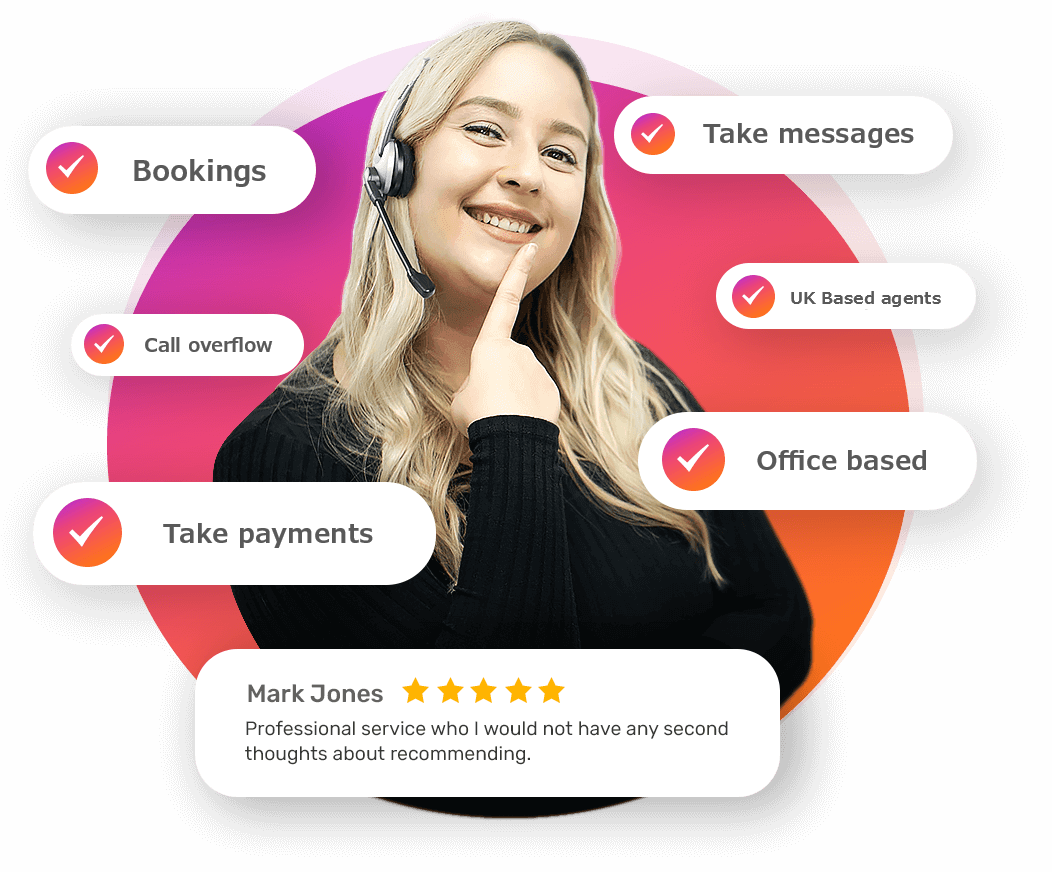Award-Winning
UK-Based
Virtual Receptionists
Your obsession is our obsession - customers! Give your customers the level of care they crave by providing dedicated professionals to answer your calls.
A business is nothing without its customers! So ensure you never miss a call from any of them again with our 5-star rated, premier telephone answering service. Our team can answer queries, nurture your customers and onboard leads just as you would.
Start your 7-day free trial today
Your business is our business.


Wait! Do Customers Still Make Calls in ?
And is it enough to warrant investing in a call handling service?Absolutely to both of those questions!
Even though we’re in the age of the internet, 65% of people still prefer to call a business via telephone.In fact, a study by the marketing moguls at Hubspot and Marketing Sherpa revealed that companies gained more customers from calls than any other avenue!
Web forms only convert customers 2% of the time.
25 to 40% of all new inbound callers become customers.
Telephone leads are 12 times more likely to convert than web leads.
With those numbers, you can see why small businesses are now outsourcing their call handling to a telephone answering service like Pocket Receptionist.
Get Started NowUK & Office-Based Receptionists Who Put Your Customers First
Expertly trained, our experienced team will look after you & your customers to support your business as it evolves & grows.
Your customers will experience exemplary service with our UK-based & in-house agents while you’ll save time and money. Our team offer:
- FAQ responses & customer care for an efficient service.
- Diary bookings & payments to save on callbacks.
- Full service, call overflow & holiday cover to suit your business.
- Call recording for your monitoring & training.
- App & real-time notifications, so you’re kept informed.
- Call satisfaction money-back guarantee to ensure you & your customer’s happiness.

Your Award-Winning Call Answering Service
We must be doing something right for businesses such as yours, as recently our work in telecommunication and web support received accreditation from the Suffolk Business Awards for Customer Excellence! We also placed as a finalist in the Business Champion Awards for The Business Innovation of the Year.
Find out moreYour Customers
Come First
Customers are the key to success, so we care for your customers just as we care for you.
It goes without saying that if customers find your service to be poor, lacklustre, or non-existent, they will go elsewhere.
Treating your customers with consideration, ensuring their needs are met and making their experience with you efficient is the best way to retain their custom and bolster your brand’s image and reputation. This inevitably leads to an increase in sales and growth – win, win!
Your business is safe in our hands because we treat your customers just as we treat you when you call our team for any reason.
Try for yourself and call 0333 335 0220. We love to chat!

Saved UK businesses
£119,540,610Saved callers being on hold for
16,201,680 secsAverage answer time of
4.32 secsOur UK-based call answering service is about you and your BPO (Business Process Outsourcing) needs. It can be tailored and structured to reduce or eliminate your missed calls, improve your customer service reputation, and reduce your current staff spending, regardless of the type of business you have.
Get a QuoteWhatever Your Business
We’ve Got You Covered
Our telephone answering service can work for anyone
"A very slick efficient service that can be tailored to suit my specific business needs. I’m very happy with the service. It creates a smart professional image & takes the strain away when I'm busy."
James Bastable, Facilica Building Services Ltd.Remain Up to Date With
Real-Time Notifications
Whether you’re a one-man band which receives a few calls a day or a large organisation receiving hundreds of calls a day, there’s a perfect package for you. And as part of our service, we’ll inform you instantly when we’ve taken a message or important call.

Want a Quote? We’d Love to Chat!
Enter your details below & we’ll get right back to you.
Alternatively, call us on 0800 009 6555 or email us at info@pocketreceptionist.co.uk & we’ll be in touch.













